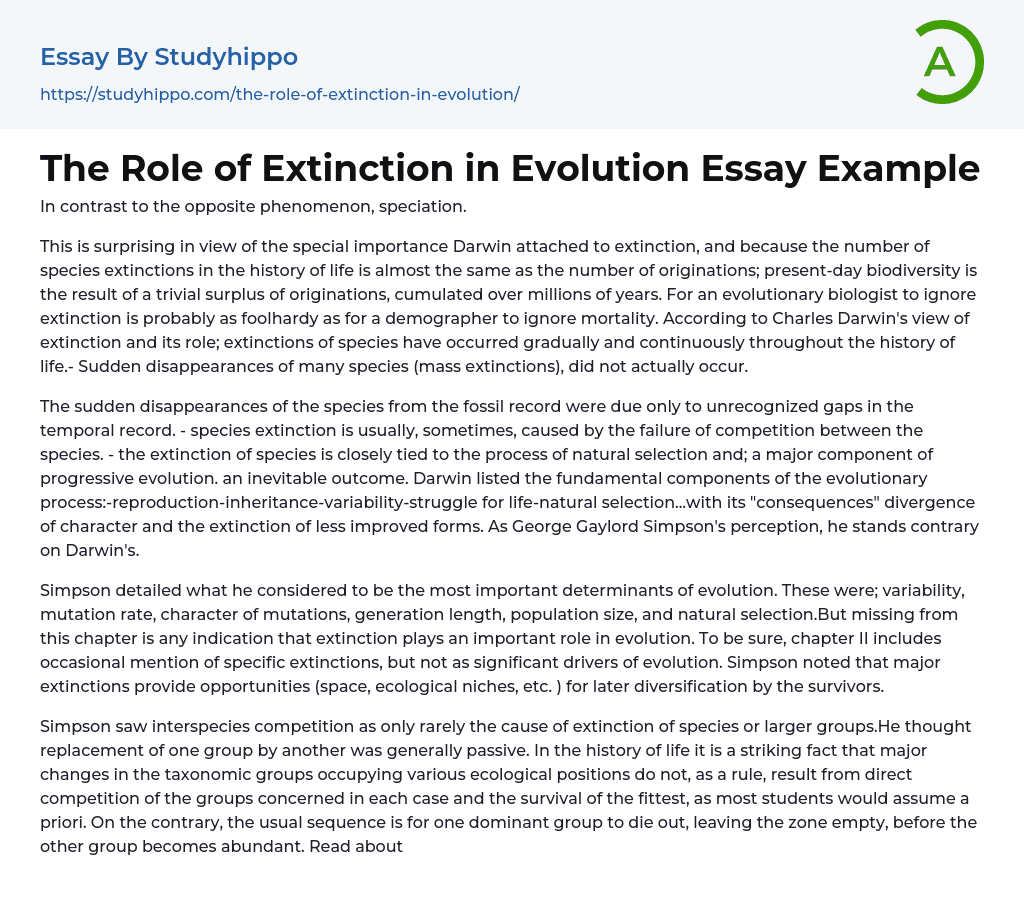In contrast to the opposite phenomenon, speciation.
This is surprising in view of the special importance Darwin attached to extinction, and because the number of species extinctions in the history of life is almost the same as the number of originations; present-day biodiversity is the result of a trivial surplus of originations, cumulated over millions of years. For an evolutionary biologist to ignore extinction is probably as foolhardy as for a demographer to ignore mortality. According to Charles Darwin's view of extinction and its role; extinctions of species have occurred gradually and continuously throughout the history of life.- Sudden disappearances of many species (mass extinctions), did not actually occur.
The sudden disappearances of the species from the fossil record were due only to unrecognized gaps in the temporal record. - species extinction is usually, sometimes, caused by the failure of competition between the species. - the extincti
...on of species is closely tied to the process of natural selection and; a major component of progressive evolution. an inevitable outcome. Darwin listed the fundamental components of the evolutionary process:-reproduction-inheritance-variability-struggle for life-natural selection…with its "consequences" divergence of character and the extinction of less improved forms. As George Gaylord Simpson's perception, he stands contrary on Darwin's.
Simpson detailed what he considered to be the most important determinants of evolution. These were; variability, mutation rate, character of mutations, generation length, population size, and natural selection.But missing from this chapter is any indication that extinction plays an important role in evolution. To be sure, chapter II includes occasional mention of specific extinctions, but not as significant drivers of evolution. Simpson noted that major extinctions provide opportunities (space, ecological niches, etc. ) fo
later diversification by the survivors.
Simpson saw interspecies competition as only rarely the cause of extinction of species or larger groups.He thought replacement of one group by another was generally passive. In the history of life it is a striking fact that major changes in the taxonomic groups occupying various ecological positions do not, as a rule, result from direct competition of the groups concerned in each case and the survival of the fittest, as most students would assume a priori. On the contrary, the usual sequence is for one dominant group to die out, leaving the zone empty, before the other group becomes abundant. Read about evidence of evolutionIt is impossible to prove that there are no exceptions to this generalization so that there is some danger that it may represent the statement of an a priori postulate rather than evidence for the postulate; but I believe that this is a valid deduction from the facts.
--- When full diversity does return, it often has a strikingly different character. A classic example is the history of marine reefs. Reef communities have been wiped out several times in the past 600 million years, coinciding in four cases with Big Five events.Each time reefs reappear, the principal framework organisms have changed, switching back and forth between calcareous algae, sponges, bryozoans, rudist mollusks, and various corals.
The contemporary term "coral reef' describes only the current occupants of that adaptive zone. For a species to survive for several million years, as many do, it must be well adapted to the physical and biological stresses normal in its environment. Tree species,
for example, that can withstand, or even benefit from, forest fires have presumably evolved this ability because forest fires are common in their environment.It may well be that most species have evolved ways of surviving anything that their environment can throw at them, as long as the stress occurs frequently enough for natural selection to operate. This implies, in turn, that likely causes of extinction of successful species are to be found among stresses that are not experienced on time scales short enough for natural selection to act Extinction is evidently selective at certain times and places but the effects tend to be subtle and require careful analysis of large data bases.Darwin's contention that all extinction is selective cannot be sustained, although this may reflect only our inability to recognize complex patterns in an imperfect fossil record.
Despite of many uncertainties, we can formulate a reasonable statement of the probable role of extinction, containing the following elements. extinction of a widespread species requires an environmental shock and it must be applied rapidly enough to prevent adaptation by natural selection or escape by migration. Survivors are most likely to be those organisms which fortunately pre-adapted to an unexpected stress.Although the extinction does not make a creative contribution by itself, it may be decisive in sustaining or eliminating such structures. The major extinctions have a profound influence on the future: both constructive and destructive.
All things are being equal to one another, it's just that the species is not well adapted on surviving the environmental pressures. It is said to be an inevitable outcome. But there are some who dictates that extinction plays no direct role in
evolution, but generally, there is a role but the study carry out very weak.
- Atmosphere essays
- Biodiversity essays
- Coral Reef essays
- Desert essays
- Earth essays
- Ecosystem essays
- Forest essays
- Lake essays
- Natural Environment essays
- Ocean essays
- Oxygen essays
- Rainbow essays
- Sea essays
- Soil essays
- Volcano essays
- Water essays
- Wind essays
- Agriculture essays
- Albert einstein essays
- Animals essays
- Archaeology essays
- Bear essays
- Biology essays
- Birds essays
- Butterfly essays
- Cat essays
- Charles Darwin essays
- Chemistry essays
- Dinosaur essays
- Discovery essays
- Dolphin essays
- Elephant essays
- Eli Whitney essays
- Environmental Science essays
- Evolution essays
- Fish essays
- Genetics essays
- Horse essays
- Human Evolution essays
- Isaac Newton essays
- Journal essays
- Linguistics essays
- Lion essays
- Logic essays
- Mars essays
- Methodology essays
- Mineralogy essays
- Monkey essays
- Moon essays
- Mythology essays




